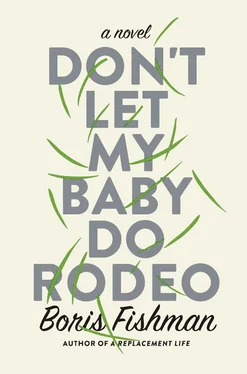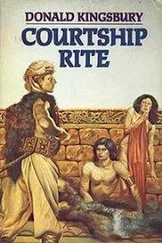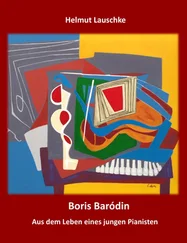“It’s strange to miss school.”
“I have the one son who doesn’t like Oreos but likes school.”
Max shrugged and puffed out his mouth.
“I love this about you,” she said. “Do you know that? I do. I don’t want you to be any other way.”
“I believe you.” Max nodded.
“We’re going to see how Papa is doing with the tent, and then we’ll go take a walk. It’s beautiful here, don’t you think?”
Max shrugged.
“You don’t think so? Aren’t you excited you’ll have a tent to sleep in again? I made Papa do it so you would be happy.”
“The ground is hard,” he said. “It’s softer at home on the lawn.”
“Just give it a shot — please. I’ve been looking forward to being away with you for so long. Just me, you, and Papa. We love Grandma and Grandpa, but just us three this one time.”
“Okay,” Max said. “I will.”
Maya and Max returned outdoors to find husband and father lost in the embrace of a giant tent that billowed in the strong wind like the sail of a boat. No sooner would Alex slide a stake through one side of the piping than the opposite would shoot out into the next camping plot over, where, luckily, there was no one to impale. Maya and Max walked over. Alex asked why Maya had bought a tent when they already had one, Max’s. If it was a purchase in error, why couldn’t it, at least, be a good one? She had bought not a tent but a barracks for a small army. The same army was needed to mount it. Alex’s monologue was halted by the arrival of a strong gust of wind. The bottom edge of the tent furled up, Alex lost his footing, and Maya and Max were soon gazing on him plastered across the hardpan, arms and legs splayed. It was only the weight of Alex’s fallen self that kept the tent from flying off with the wind.
Max moved off toward a post with a coil of rope tied around it. One decorated the edge of every campsite — it was the border. Max unwound the rope, looping one end over the post and the other through an opening at the crown of the tent. This gave the operation the traction it needed. Maya and Alex watched their son move around the tent, staking poles into the hardpan, which, now shimmied properly, held the poles with unvarying force. Finally, it was impossible to continue without Alex giving up his position, and he crawled off the tent. Muttering, he walked off to wash his hands. Indeed, Maya had made an error — the tent was much too big for three. But it was beautiful, too, warlike and protective at once, a dryland ship awaiting assignment.
+
“Call me Rose, call me Ranger Rose, call me Ranger Holliver. But don’t call me ‘lady,’ don’t call me ‘yo,’ and no ‘hey there’s, okay? Mom Holliver did not sit with a name-omen book for three days for no reason.” The retirees filling out the noon naturalist walk chuckled. Maya gripped Max’s hand. Alex had insisted they go alone. He would spend time with the map, designing the shortest route to Adelaide, Montana. Maya felt a wave of futility. On a weekday in late October, when the adult world was at work, she was in an arid moonscape with a child and ten old people in the downswing of their lives. She felt at once undeservedly idle and frantic to no purpose.
“Late-season groups are my favorite,” Rose Holliver said. “This is the time to see it.” Her chest was shapeless in a many-pocketed worsted forest-green shirt, her belly hemmed in by coarse gray slacks with black piping. The strap from her broad-brimmed gray hat accentuated the downy ampleness of her chin, the cinch making Maya think of horses and bits. Where did Rose Holliver come upon love in this emptiness? Or was there a man who joined her in the modest trailer they shared in a residential development nearby after his own day working at something for the national park? They fried hamburgers, on special nights they had merlot from the store. They had a half collie that had appeared one day and had been seduced into staying by leftover hamburger bits. In the evenings they watched the same television shows that Alex and Eugene watched, and they even paid a fee to the neighborhood association for electricity and water. Was their life so different? What difference did location make if they got along and liked the same things — she fried; he washed up after they finished. Maya had come ready to find savages, desperate characters, the poor, but there was no savagery. It was nice between Rose and (Trent? Charlie?), it was close, the shaggy collie watching the two lovers until they stopped and had a laugh over the dog’s watching. They didn’t smoke after sex. They didn’t have children, and probably wouldn’t. (Whereas Maya was forty-two but looked thirty-two, Rose looked forty-two but was thirty-two: she was the fertile one.) They had the pup. They called him Anna. Like Santa Anna, not like a girl.
Rose was giving out information about the Badlands: It looked like hopeless rock, but two-thirds was actually grass prairie. Maya was gratified by the information: It answered her earlier question. “You could run a herd of cattle on here if you wanted,” Rose said. Maya pulsed Max’s hand. They were on a mile-long boardwalk that led from the visitor center to an overlook down on a hundred-mile ridge of striated stone that ran all the way into Nebraska. Nebraska! To Maya, the word was as exotic as Neptune, and yet Maya stood within sight of it. Actually faced, it seemed unfamiliar and ordinary all at once.
Max looked up at Maya. “Grass, Max,” Maya said, and nodded encouragingly. But he gave no reaction.
Rose was counting on her fingers, the thumbs male in their thickness: “Some of the last wildflowers you’ll see before we get this freeze in the next couple of days: prickly pear, prairie coneflower, needle and thread, sideoats grama. .”
After the dim glass cases of the visitor center, the wood-etched signage around the park, and the shit-brown bathroom stalls that followed their progress down the boardwalk, the names of the grasses were beautiful. Sideoats grama sounded like a Negro jazz act. Maya wanted to know who got to name them. Even though the seniors were regularly interrupting the lecture, calling out “Ranger Holliver?” with happy compliance, Maya was too shy to raise her hand. Max might know, she thought, but he was refusing to become involved.
Rose was on to the animal life. Two small birds, black knobby heads and torsos like white eggs, were bouncing on the upper rail of the fence separating the visitors from the wilderness. “Little tuxedoes they’ve got on,” Rose said. The birds had a hot-turquoise cummerbund on each flank — nature’s bid for grace and surprise amid the universe’s black-and-white plodding. “Who can tell me who these little guys are?” Rose said. “Your prize is a refund on your tour ticket.” The retirees grumbled with laughter — the tour was free. Maya knelt in front of Max: “Max, honey, do you know what kind of bird that is?” Someone said butcher-bird. No, a flycatcher. “It’s just a magpie,” he whispered. Maya leaped to her feet. “We know!” she exclaimed. The retirees swiveled and gazed admiringly down on the young mother with the fair-haired boy. “Now this apple did fall far from the tree,” a tall man with watery eyes said. Chuckles murmured through the group. “I’d give a dollar to be your age, young naturalist. The bottom dollar.”
Maya, stung by the first comment, was placated by the second. “Tell them, honey,” Maya said, looking down at Max. But her son stepped a half foot behind her and dropped her hand. Rose and the retirees waited. “Max,” Maya hissed. “Magpie.” He turned and faced away from the group. Maya colored. She looked back at the seniors and swallowed. “We’re shy today,” she said apologetically, wondering if her accent was coming through. What had seemed unimpeachable emerging from Max’s mouth felt like an embarrassing guess from her own. “Magpie?”
Читать дальше












